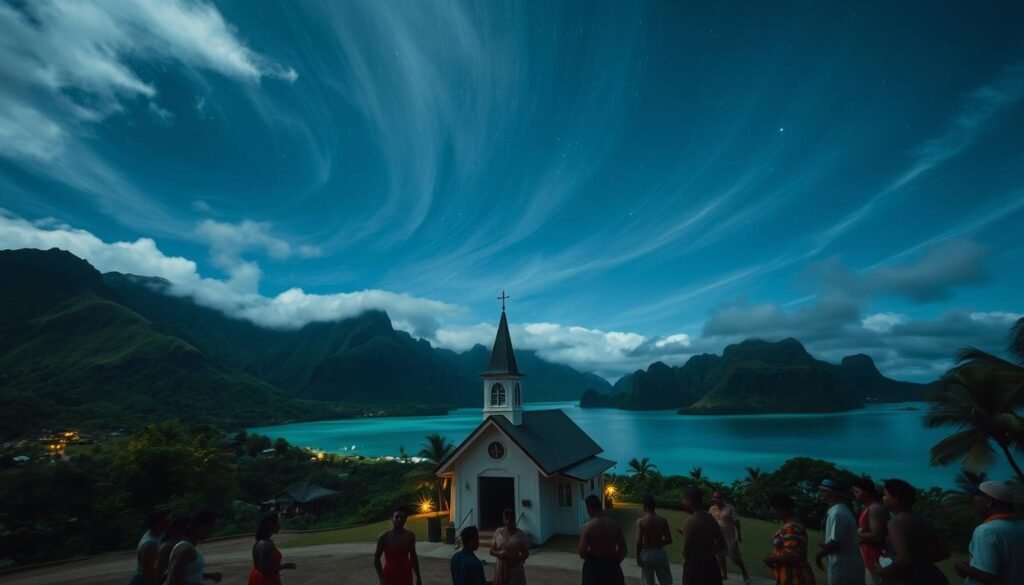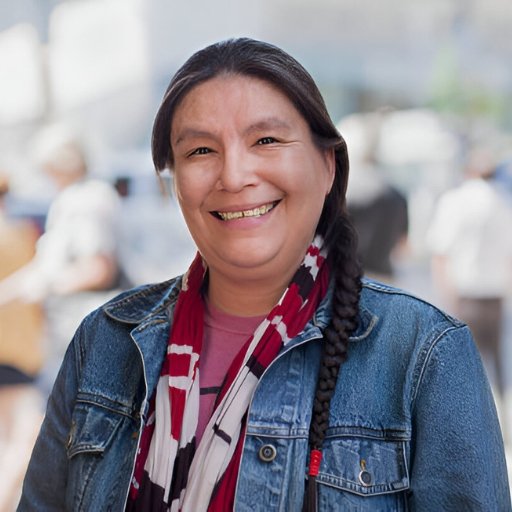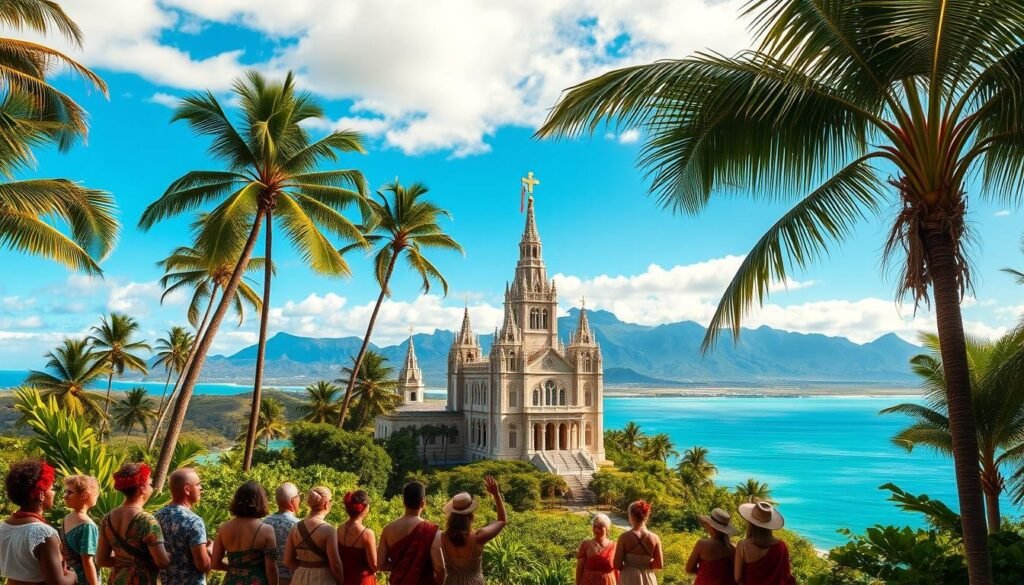Last updated on October 20th, 2025 at 11:47 am
Why Are So Many Polynesians Mormon? Have you ever wondered why so many Polynesians are Mormon? The bond between Mormonism in Polynesia and Polynesian culture is fascinating and complex.
This article will delve into the historical, cultural, and social reasons behind Mormonism’s popularity in Polynesia. You’ll learn about the early missionary efforts and their lasting influence.
Exploring how Mormonism and Polynesian culture intersect will give you a deeper understanding. You’ll see why this connection is significant and its impact on local communities.
Contents
- 1 The Historical Connection Between Polynesians and Mormonism
- 2 Why Are So Many Polynesians Mormon? A Cultural Analysis
- 3 The Role of BYU-Hawaii and the Polynesian Cultural Center
- 4 Mormon Missionary Work in Polynesia
- 5 The Impact of Mormon Communities on Polynesian Diaspora
- 6 Challenges and Criticisms of the Polynesian-Mormon Relationship
- 7 Conclusion: Why Are So Many Polynesians Mormon?
- 8 FAQ
- 8.1 What is the historical connection between Polynesians and Mormonism?
- 8.2 How has Mormonism impacted Polynesian culture?
- 8.3 What role have institutions like BYU-Hawaii and the Polynesian Cultural Center played in promoting Polynesian culture and Mormon values?
- 8.4 How have Mormon missionaries contributed to the growth of Mormonism in Polynesia?
- 8.5 What challenges do Polynesian Mormons face in the diaspora?
- 8.6 What criticisms have been raised about the Polynesian-Mormon relationship?
- 8.7 How has the Mormon faith helped Polynesian migrants cope with the challenges of migration?
- 8.8 What is the significance of ancestor worship in Polynesian Mormonism?
The Historical Connection Between Polynesians and Mormonism
In the 19th century, Mormon missionaries went to the Pacific Islands. They started a complex relationship between Polynesian cultures and Mormonism. These early missionaries faced big challenges as they tried to convert the locals to their faith.
They had to overcome cultural and language barriers. Yet, they managed to make a start. Their work helped Mormonism grow in Polynesia, shaped by history, culture, and society.
- They learned local cultures and languages well.
- They built strong community ties and networks.
- They offered education and social services.
Mormonism’s growth in Polynesia wasn’t just because of missionaries. It was also shaped by history, like colonialism. Learning about this time helps us understand how Mormonism spread.
Early Missionary Efforts
The first Mormon missionaries in Polynesia were true pioneers. They faced cultural, language, and environmental challenges. Their hard work and commitment helped establish Mormonism in the area.
Looking into the history of Polynesians and Mormonism shows us cultural exchange and religious spread. This story highlights the complex nature of human interaction and how cultures can influence each other.
Why Are So Many Polynesians Mormon? A Cultural Analysis
Many Polynesians find Mormonism appealing because of its strong family and community focus. This fits well with their cultural values. Exploring this further, you’ll see how these values help explain why many Polynesians choose Mormonism.
Family and community are key in Polynesian cultures. These societies value family ties that go beyond immediate relatives. Mormonism’s emphasis on family and community resonates with these values.
The Importance of Ancestor Worship in Polynesian Mormonism
Ancestor worship is a big part of Polynesian cultures. It’s a spiritual practice where ancestors are honored. Mormonism’s teachings on eternal families and family ties connect well with these traditions.
The table below shows how Polynesian Mormon practices match Mormon teachings. [Why Are So Many Polynesians Mormon?]
| Cultural Practice | Mormon Teaching | Alignment |
|---|---|---|
| Ancestor Worship | Eternal Families | Strong |
| Community Solidarity | Community Focus | Strong |
| Family Ties | Family Importance | Strong |
As shown, Polynesian Mormon practices and Mormon teachings are closely aligned. This makes it easier for Polynesians to embrace the faith. The focus on family, community, and ancestor worship provides a solid base for Mormonism in these cultures.
In conclusion, the relationship between Mormonism and Polynesian cultures is complex and deep. Understanding these cultural dynamics helps us appreciate why many Polynesians are Mormon. [Why Are So Many Polynesians Mormon?]
The Role of BYU-Hawaii and the Polynesian Cultural Center
Exploring the roles of BYU-Hawaii and the Polynesian Cultural Center reveals their importance. They nurture the cultural and spiritual lives of Polynesians. These places are more than just schools or cultural spots; they are lively centers of Polynesian heritage and Mormon values.
BYU-Hawaii is a special place for students from Pacific Island backgrounds. It offers a curriculum that blends academic rigor with cultural relevance. This allows students to link their studies with their cultural roots. The university’s focus on service and community mirrors Mormon values, creating a sense of belonging among students.
The Polynesian Cultural Center is a key cultural site that highlights Pacific Island diversity. It showcases the heritage through exhibits, performances, and educational programs. This center draws visitors worldwide, connecting Polynesian communities with a global audience.
Together, BYU-Hawaii and the Polynesian Cultural Center meet the cultural, educational, and spiritual needs of Polynesian Mormons. They provide a space where faith and culture are celebrated and expressed with energy.
Mormon Missionary Work in Polynesia
You might be surprised to learn about the extensive missionary work conducted by Mormons in Polynesia. For over a century, Mormon missionaries have been active in the region. They have played a crucial role in shaping local communities.
Mormon missionary work has led to the establishment of numerous churches and chapels. It has also contributed significantly to education and healthcare in Polynesia. Many missionaries have dedicated their time to teaching and community service. This has fostered a strong bond between the Mormon community and local populations.
The impact of Mormon missionaries can be seen in various aspects of Polynesian society. From language training to vocational education, their contributions have been multifaceted. Moreover, the cultural exchange between Mormon missionaries and Polynesian communities has enriched both parties. It has promoted understanding and cooperation.
Key Areas of Influence
- Establishment of churches and chapels
- Education and vocational training
- Healthcare services
- Cultural exchange programs
The table below summarizes the key statistics related to Mormon missionary work in Polynesia:
| Country | Number of Mormon Missionaries | Mormon Population |
|---|---|---|
| Tonga | 200 | 50,000 |
| Samoa | 150 | 30,000 |
| Fiji | 100 | 20,000 |
As you can see, the presence of Mormon missionaries has been significant in these countries. It has contributed to a substantial Mormon population. The work of these missionaries continues to be a vital part of the church’s activities in the region.
In conclusion, Mormon missionary work in Polynesia has been a pivotal factor in the church’s growth. It has helped the church integrate into local communities. The legacy of their work is evident in the thriving Mormon populations across the Pacific.
The Impact of Mormon Communities on Polynesian Diaspora
Mormonism and Polynesian culture meet in diaspora communities. Exploring Polynesian Mormons’ experiences shows how faith shapes their new environments.
Mormon groups are key in supporting Polynesian migrants. They offer a sense of belonging and keep cultural heritage alive. This support comes in many ways, like:
- Cultural events that celebrate Polynesian traditions
- Language classes that help preserve native languages
- Community services that assist with integration into the new society
These communities have a big impact. For example, Mormon churches act as a bridge between cultures. They help with:
- Finding employment and housing
- Adapting to a new educational system
- Maintaining cultural identity in a diverse environment
The Mormon faith also offers emotional and spiritual support. It helps deal with migration stress and building a new life. The community and shared values provide comfort. [Why Are So Many Polynesians Mormon?]
In summary, Mormon communities deeply affect the Polynesian diaspora. They offer practical help, keep cultural identity strong, and provide spiritual guidance. As you delve deeper, you’ll see the complex and multifaceted bond between Mormonism and Polynesian culture.
Challenges and Criticisms of the Polynesian-Mormon Relationship
Exploring the Mormon-Polynesian relationship reveals many challenges and criticisms. This mix of Mormonism and Polynesian culture has sparked debate. People worry about how this religious choice affects the native culture.
One big criticism is that Mormonism might harm traditional Polynesian ways. Some believe it could lead to losing cultural heritage. This tension between keeping cultural identity and following religious beliefs is complex and needs more study.

The table below shows some key challenges and criticisms of the Mormon-Polynesian relationship:
| Criticisms | Challenges | Impact |
|---|---|---|
| Cultural erosion | Balancing traditional practices with Mormon beliefs | Potential loss of cultural heritage |
| Religious homogenization | Maintaining cultural identity within a global religious framework | Risk of cultural assimilation |
| Community expectations | Navigating the expectations of both Mormon and Polynesian communities | Potential for community conflict |
These issues highlight the need for a detailed look at the Mormon-Polynesian relationship. By diving into its complexities, we can better understand how culture and religion blend.
The bond between Mormonism and Polynesian culture is complex. Many factors shape the lives of those in these communities. As we delve deeper, we’ll see more discussions about the future of this cultural and religious mix.
Conclusion: Why Are So Many Polynesians Mormon?
You now know why many Polynesians have turned to Mormonism. This choice is influenced by history, culture, and society. We’ve looked at these factors in depth. [Why Are So Many Polynesians Mormon?]
Missionary work has been key since the start. Today, places like Brigham Young University-Hawaii and the Polynesian Cultural Center help keep this bond strong.
Reflecting on this, we see Mormonism’s appeal among Polynesians is complex. It’s shaped by culture, history, and society. To understand this, we must delve into these areas.
The bond between Polynesians and Mormonism is both rich and intriguing. It’s a significant part of many lives. As this story grows, it remains an area of deep interest and study.
See Also: Why Did Mormons Leave New York?
FAQ
What is the historical connection between Polynesians and Mormonism?
In the 19th century, Mormon missionaries first arrived in the Pacific Islands. They established a presence and set the stage for Mormonism’s growth in Polynesia.
How has Mormonism impacted Polynesian culture?
Mormonism has deeply influenced Polynesian culture. It aligns with Polynesians’ strong family and community values. These values are central to their culture and way of life.
What role have institutions like BYU-Hawaii and the Polynesian Cultural Center played in promoting Polynesian culture and Mormon values?
BYU-Hawaii and the Polynesian Cultural Center have been key. They promote both Polynesian culture and Mormon values. They help foster a sense of community and cultural identity among Polynesians.
How have Mormon missionaries contributed to the growth of Mormonism in Polynesia?
For over a century, Mormon missionaries have been active in Polynesia. They’ve built churches, provided education and healthcare. Their efforts have shaped the social and cultural landscape of the region.
What challenges do Polynesian Mormons face in the diaspora?
Polynesian Mormons face challenges when they migrate to new places. They must navigate new environments and keep their cultural identity. Mormon communities offer significant support in these efforts.
What criticisms have been raised about the Polynesian-Mormon relationship?
Some question the impact of Mormonism on Polynesian culture. Others highlight the complexities of Mormonism and indigenous cultures. A nuanced understanding of these dynamics is crucial.
How has the Mormon faith helped Polynesian migrants cope with the challenges of migration?
The Mormon faith has given Polynesian migrants a sense of community and support. It helps them deal with migration challenges and keep their cultural identity intact.
What is the significance of ancestor worship in Polynesian Mormonism?
Ancestor worship is vital in Polynesian culture. Mormonism has embraced this value. It emphasizes family ties and community solidarity. [Why Are So Many Polynesians Mormon?]

Ramona Pearson is a U.S.-based religious researcher and writer with over 10 years of experience studying Mormon history and beliefs. She is also a practicing Mormon and writes to inform readers with accuracy and balance.

